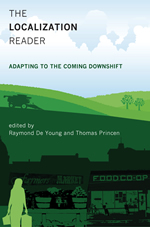
THE LOCALIZATION READER: ADAPTING TO THE COMING DOWNSHIFT
Raymond De Young and Thomas Princen (Eds.)
Cambridge, MA: The MIT Press
Energy supplies are tightening. Persistent pollutants are accumulating. Food security is declining. There is no going back to the days of reckless consumption. But there is a possibility — already being realized in communities across North America and around the world — of localizing, of living well as we learn to live well within immutable constraints.
Society is shifting from the centrifugal forces of globalization (cheap and abundant raw materials and energy, intensive commercialization, concentrated economic and political power) to the centripetal forces of localization: distributed authority and leadership, sustainable use of nearby natural resources, community self-reliance and cohesion. While attention shifts to the local, there are crucial regional, national and international dimensions.
This book, combining original and classic works, shows how localization—a process of affirmative social change — can enable psychologically meaningful and fulfilling lives while promoting ecological and social sustainability. Topics range from energy dynamics to philosophies of limits, from the governance of place-based communities to the discovery of positive personal engagement. Together they point the way to a transition that can be peaceful, democratic, just and environmentally resilient.
Contributors
Gar Alperovitz, Sharon Astyk, Wendell Berry, Adam Dadeby, Raymond De Young, John S. Dryzek, David J. Hess, Robert Hopkins, M. King Hubbert, Ivan Illich, Warren Johnson, Rachel Kaplan, Stephen Kaplan, Karen Litfin, Thomas A. Lyson, Dennis Meadows, Donella Meadows, Lester W. Milbrath, Thomas Princen, Jorgen Randers, Josiah Royce, Kirkpatrick Sale, Ernst F. Schumacher, Michael Shuman, Joseph A. Tainter, Robert L. Thayer
Editors
Raymond De Young and Thomas Princen are professors at the School of Natural Resources and Environment at the University of Michigan. De Young is the author of The Localization Papers. Princen is the author of The Logic of Sufficiency (2005) and Treading Softly: Paths to Ecological Order (2010), both published by the MIT Press.
- Book reviews
- http://www.feasta.org/2012/04/27/the-localization-reader-adapting-to-the-coming-downshift-review/
- http://www.resilience.org/stories/2012-06-06/review-localization-reader
- http://www.resilience.org/stories/2013-01-27/review-the-localization-reader-edited-by-raymond-de-young-and-thomas-princen
Royalties
All royalties are committed by contract to two community organizations that exemplify localization. Growing Hope is an organization dedicated to helping people improve their lives and communities through gardening, healthy food access, and local food security (www.growinghope.net) and People’s Food Co-op has long sought to feed a community with wholesome food and good work (www.peoplesfood.coop).
- Endorsements
- “This engaging reader, with lively contextual writing by the editors, presents the best thinking about localization, going back to Fritz Schumacher, Ivan Illich, and Wendell Berry and forward to Rob Hopkins, Rachel and Stephen Kaplan, and Sharon Astyk. The Localization Reader is an eclectic mix of great writing and plugs a decade-long gap of serious books on this subject.” —Ted Bernard, Professor, Environmental Studies Program, Voinovich School of Leadership and Public Affairs, Ohio University
- “’Think globally, act locally’ means thinking about the local as well as the global. De Young and Princen provide both new essays and classics that delve deeply into localization. This book will transform the way we think about sustainability as both a personal and a political issue.” —Thomas Dietz, Professor of Sociology and Environmental Science and Policy and Animal Studies, Assistant Vice President for Environmental Research, Michigan State University
- “Global warming drives environmental change. Resource scarcities threaten the economy. The Localization Reader provides critical information, inspiring visions, and sound advice to get on top of these processes rather than live in fear of them.” —Richard B. Norgaard, University of California, Berkeley
- “A needed entry in the discussion of alternative futures. Students will benefit greatly from its concerns and insights.” —Daniel Mazmanian, Director, John Bedrosian Center on Governance and the Public Enterprise, University of Southern California